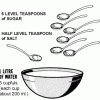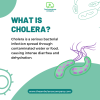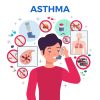Monkey pox is rare, but it is increasing the number of cases being discovered across the world.
WHAT YOU NEED TO KNOW ABOUT MONKEYPOX
What are the signs and symptoms of monkey pox?
Monkeypox symptoms are similar but milder than smallpox symptoms. Early signs of monkeypox include flu-like symptoms such as:
- Fever, headache, muscle aches, fatigue, and swollen lymph nodes.
After one to three days, a rash with raised bumps develops. The rash often starts on the face and then spreads to other parts of the body, including the palms and soles of the hands and feet respectively. The rash starts as flat, red bumps. The bumps turn into blisters filled with pus. After several days, the blisters crust over and fall off.
How does one contract monkey pox?
Monkeypox spreads when one comes into contact with an animal or a person infected with the virus. Animal-to-person transmission occurs through broken skin, like from bites or scratches, or through direct contact with an infected animal’s blood, bodily fluids, or pox lesions.
Monkeypox can also spread from person to person, but it is less common.
Person-to-person spread (transmission) occurs when one encounters the viral particles from another person. When an infected person coughs or sneezes, the virus can transmit through airborne droplets. It requires prolonged face-to-face contact, but one can then breathe in these tiny droplets from someone else or get them in their eyes or nose. One can also get it directly from touching the lesions on an infected person.
One can also get monkeypox by coming into direct or indirect contact with materials contaminated with the virus. These materials can include clothing, bedding, and other linens used by an infected person or animal.
How is monkeypox diagnosed?
Due to its rare nature, it may first be suspected to be other rash illnesses like measles, chickenpox, or smallpox.
However, swollen lymph nodes distinguish monkeypox from other poxes.
To diagnose monkeypox, a healthcare provider takes a tissue sample that is looked at using a microscope. One may also need to give a blood sample to check for the monkeypox virus or antibodies the immune system makes against it.
How long does monkeypox last?
The illness typically lasts for 2 to 4 weeks.
Is there a treatment or vaccine for monkeypox?
Currently, there is no proven, safe treatment for monkeypox. Smallpox and monkeypox are caused by similar viruses, so when people get vaccinated against smallpox, it also protects them from getting monkeypox. Since smallpox is no longer a disease that people get vaccination for, most people would not have that protection against monkeypox.
How to prevent monkeypox
Prevention depends on decreasing human contact with infected animals and limiting person-to-person spread. One can prevent monkeypox virus by:
- Avoiding contact with infected animals (especially sick or dead animals).
- Avoiding contact with bedding and other materials contaminated with the virus.
- Avoiding contact with people who may be infected with the virus.
- Washing hands with soap and water after coming into contact with an infected animal or human.
- Thoroughly cooking all foods that contain animal meat or parts.
- Using personal protective equipment (PPE) when caring for people infected with the virus.
If you found this information helpful, please share it with your friends and family on Twitter, Instagram, Facebook and even on Whatsapp for others to learn something new and protect themselves from this . Click here to learn more about on our other topics on emergency preparedness and firstaid care tips.






